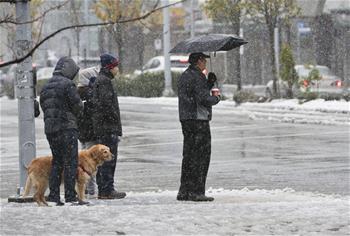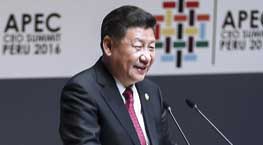by Xinhua writer Chen Shilei
BEIJING, Dec. 6 (Xinhua) -- The U.S. strategy on the Asia-Pacific under whichever administration should not be contemplated to the detriment of the interests of other countries, and any miscalculation thereof could lead to regional instability.
U.S. Defense Secretary Ash Carter, who is scheduled to step down in January, started Monday a tour in Asia that takes him to Japan and India.
The tour, which seems to reassure America's Asia allies amid anxieties caused by Donald Trump's election, also brings a big question mark over the Trump administration's future policies on the Asia-Pacific.
During U.S. President Barack Obama's nearly-eight-year tenure, Washington has shifted its foreign policy focus from the Mideast war quagmire to the Asia-Pacific, which many believe is aimed at containing a rising China.
Tensions on the Korean Peninsula have escalated after the United States decided to deploy an anti-ballistic missile system in South Korea.
The South China Sea issue emerged as a hot topic after the United States hyped the concept of "freedom of navigation" and embolden the former Philippine government to initiate a case about maritime territorial disputes with China at a ragtag international arbitral tribunal, which ran from 2013 to July 2016. Carter even boarded a U.S. aircraft carrier in the South China Sea in late 2015 to "show muscle".
Facts show that the U.S. rebalance to the Asia-Pacific has not brought about any peace and stability in the region, but, on the contrary, has put regional situation at risk in the end.
Under such a circumstance, it is high time for Washington to reconsider and reassess its policy on the Asia-Pacific, which could usher in a strategic opportunity for the Trump administration.
Meanwhile, U.S. long-time allies, particularly Japan, may feel relieved after Trump's rhetoric of challenging their alliance during the presidential campaign has been played down.
Japanese Prime Minister Shinzo Abe's meeting with Trump in mid-November -- Trump's first face-to-face meeting with a foreign leader since his election, Carter's visit to Japan and Abe's upcoming visit to Hawaii including Pear Harbor, the site of Japan's surprise attack that dragged the United States into World War II, have demonstrated both's eagerness to maintain their close ties.
But such an alliance along with Washington's future Asia-Pacific strategy should not be established on the basis of harming the interests of third parties and challenging their bottom line.
A far more stable Asia-Pacific serves the interests of all countries in the region, including the United States and its allies.










